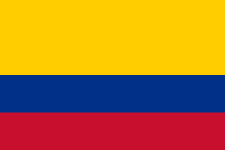We’re currently cruising down the coast of Peru towards our
next port, Salverry, but we've spent the last two days in Ecuador. Ecuador is one of the smaller countries of
South America and it was the first country we've been to where we've had
multiple stops: the busy fishing port of Manta, the UNESCO World Heritage
listed capital Quito (founded 1534) and the largest city Guayaquil.
Ecuador is a land of extreme contrasts in geography extending from the dryer coastal plains to the west, the Andes in the centre and the Amazon to the east united by their common theme: the equator. There are only two seasons – wet and dry except in the Amazon where they have the wet season and the rainy season. The sun rises and sets around 6 every day of the year and you can view constellations from both the Northern and Southern hemispheres at once. As an equatorial country they are out of the cyclone belt however there are active volcanoes and earthquakes occur from time to time.
The country mainly exports primary produce: tuna, prawns,
bananas, cacao beans, oil and oddly flowers.
Because they can produce crops all year round, there is a huge export
market for their roses which have stems up to 2 metres long! Russia is apparently a big market. They assemble some vehicles for Chevrolet,
Mazda, Kia and Hyundai as well and use the US dollar as official currency (!?).
A democratic country, there is an election scheduled for February
2013 and they have only 45 days to campaign, so we were in the thick of
it. There are 8 candidates for
President, plus Assembly seats up for grabs.
Ecuador was one of the countries
Simon Bolivar campaigned for liberation from Spain in his effort to make Gran Colombia – similar to the United States.
That dream didn’t materialise, however independence from Spain did in
the early 1800s. Ecuador, Colombia and
Venezuela all share the same basic flag bases on the themes of yellow for the sun
and gold, red for the bloodshed spent in their liberation and blue for the
ocean and sky. Ecuador’s flag also has
the national bird, the condor on it, Venezuela’s has 7 (or 8) stars, whilst
Colombia’s just has the three colours.
 |
| Ecuador |
 |
| Venezuela |
 |
| Colombia |
Of course Ecuador is also famous for the Galapagos Islands
where Charles Darwin in a brief visit studied the evolution of finches on the
different islands that became one of the foundation concepts for
evolution. We didn’t visit there
(another trip maybe?) as it’s quite some distance from the coast, however we were lucky enough to fly to Quito.
Quito at 9,350 ft./2,800 is the second highest Capital City in the
world (after La Paz in Bolivia), and is right in the middle of the Andes. That’s over 2,000 ft. higher than any spot in
Australia to put it into perspective. Of
course, the Incas were there before the Spanish and the Quitu and Caras indigenous tribes before then – this is a child’s shrunken head from the Amazon.
The people are a mixture of those original inhabitants and
the Spanish. It is one of the few
countries where I am above average height for women, so that was a refreshing
change. Crime is not a major issue
however usual big city vigilance was necessary.
Oddly there are a huge number of Australian plants all over the place:
bottlebrushes, Grevilleas, wattles, Norfolk Island pines…
In 1736 a French led international Geodesic expedition went to just north of Quito
to find the centre of the world and this monument commemorates it. We’re in different hemispheres - Mitad del Mundo. With modern GPS systems it's actually in the wrong spot by a few hundred metres, but it's constantly changing so this will do. Note Paul’s Panama hat – can’t take him
anywhere!
The
real highlight was the amazing colonial architecture from the 16th
century that extends across the 12 sq kms of Colonial Downtown.
Fortunately restored and preserved due to the UNESCO
patrimony, it is still the centre of government and home to 2.2 million people,
although the larger port of Guayaquil claims to be the business centre and
there seems to be a certain conflict – it was described to us as Washington DC
to New York. As Canberra residents, this
is a concept we understand.
The food - even watered down for Western palates –
particularly the fruit – is amazing.
Ecuador is apparently a popular spot for US citizens to retire and we
can certainly see why.









your doing a geeat job with these blog posts. Keep it up and they are very interesting to read
ReplyDeleteThat shrunken head is horrible ....
ReplyDeleteתודה לך על כתיבת מאמר מעניין. אני מקווה שאתה יכול לקרוא בעברית
ReplyDelete